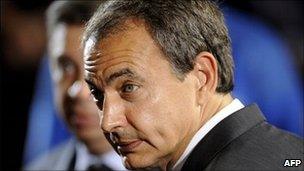Spanish borrowing costs rise in bond auction
- Published

Spanish PM Jose Luis Rodriguez Zapatero has delayed his holiday to tackle the crisis
The cost of borrowing for the Spanish government has risen sharply at its latest debt auction.
The government successfully sold 3.3bn euros ($2.1bn, £2.9bn) worth of new bonds to investors.
However, the interest rate on 2.2bn euros worth of the debt - to be repaid in 2014 - rose to 4.813% from a rate of 4.037% at a bond sale in early June.
It also later cancelled an auction planned for 18 August, delaying its next money raising until September.
Spain has struggled to retain the confidence of lenders due to worries about its ability to pay its debts.
European Commission President Jose Manuel Barroso has written this week to all 27 members of the EU asking them to give their "full backing" to the protection of the euro currency zone.
He described developments in the bond markets surrounding Spanish and Italian sovereign debt as being "a cause of deep concern".
He also warned that, "we are no longer managing a crisis just in the euro-area periphery".
Prime Minister Jose Luis Rodriguez Zapatero recently delayed his summer holiday to address the mounting concerns about the government's finances.
He has also faced continuing protests against government spending cuts.
The latest bond auction also raised a further 1.1bn euros through four-year bonds that carried an interest rate of 4.98%.
However, analysts said that the Spanish government would be reassured by strong demand from investors for its bonds.
"It was certainly better than the market was fearing," said Peter Chatwell a strategist at French bank Credit Agricole.
Bonds are a form of I-owe-you issued by governments and companies seeking to borrow money.
The Spanish government has now issued 60% of its planned borrowing for the year.
- Published4 August 2011
- Published3 August 2011
- Published3 August 2011
- Published29 July 2011